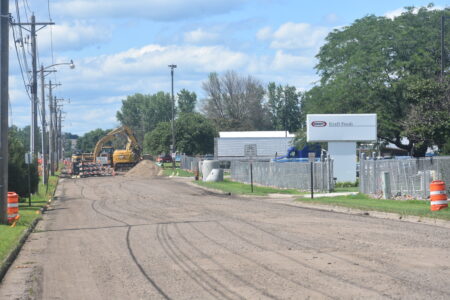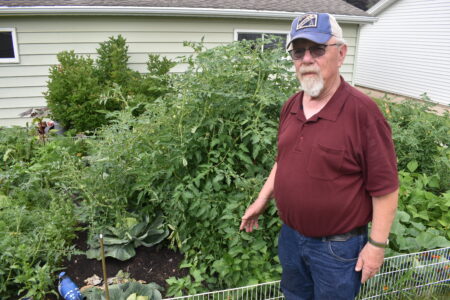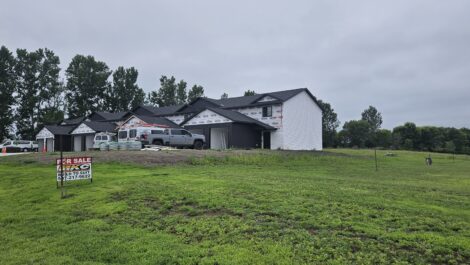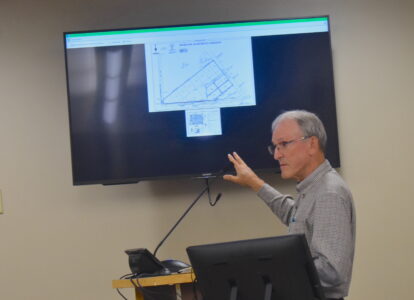LWV energy conservation forum series continues

New Ulm Public Utilities Energy Service Representative Derek Nelson discusses Minnesota's Conservation Improvement Programs during the a League of Women Voters sponsored forum on energy conservation.
NEW ULM – Energy conservation options are plentiful in New Ulm for those looking.
Thursday at the New Ulm Library, Public Utilities Energy Service Representative Derek Nelson gave a breakdown of energy uses in the community and potential rebate options. He was joined by Turner Hall Executive Director and City Council President, Andrea Boettger, who spoke on her experiences with energy rebates.
The presentation was the second in a series of four conservation-themed forums held by the League of Women Voters (LWV).
Nelson opened the forum by discussing the Conservation Improvement Program (CIP). CIP was created to help Minnesota residents, utilities and businesses save money and energy in their natural gas and electricity use. Some of CIP’s benefits are improving awareness and adoption of energy efficient technologies.
CIP was founded in 1980 following the energy crisis from the 1970s. The Minnesota Public Utilities Commission wanted to be more energy independent. Nelson said over the years CIP has evolved and today the focus is reducing carbon dioxide emissions and conserving resources.

Turner Hall Executive Director Andrea Boettger discusses converting the historic building to LED lighting, during the League of Women Voters energy conservation forum series.
In 2007, Minnesota passed the Next Generation Energy Act. Nelson said the idea behind this act was to acquire energy data from users through rebate incentives.
Rebates are given for installation of high-efficient heating or cooling units; water heating appliances, Energy Star rated LED lighting and Energy Star appliances.
New Ulm Public Utilities also has a program to pay for home energy audits. Nelson said utilities does not capture any energy savings from the audit, but helps residential and commercial customers determine the efficiency of a property. The audit could help a customer prioritize ways to improve a properties energy efficiency and possible reduce the energy load on New Ulm’s grid.
Nelson said changing to LED light is a popular starting point for businesses. He said it was a simple change and with the rebates, switching to LED can be a quick payback through energy savings.
In 2019, Turner Hall took advantage of a Department of Employment and Economic Development (DEED) to switch out the old lighting for LED.
Boettger said before converting to LED lights, Turner Hall’s gym had significantly diminished lighting. Many of the old bulbs no longer worked or were dying. Several sections of the gym were too dim to use.
Boettger said with Turner Hall hosting the oldest gymnastics program and oldest bar in Minnesota, she felt it was necessary to update and maintain the facility.
“Sound minds, sound bodies,” she said quoting Turner Hall’s motto.
Boettger applied for the DEED grant and received $6,000 for the LED light upgrades. All the older bulbs were replaced with LED. It was a reduction of 24 lights to 12 lights. She said the difference was extreme. The gym was lit brighter than it had been in years.
Turner Hall also saw cost savings, with a $400 a month decrease in electrical uses. Combined with the DEED rebate, it took less than two years to see an overall cost savings from the upgrade.
Boettger also spoke on city efforts to reduce energy waste.
“No matter who you are and what you believed, being able to use something as long as you can before you get rid of it throw it away is something we can all get behind,” she said.
Recently, the city has begun looking at installing solar panels on city owned buildings. Nelson confirmed the New Ulm Economic Development Authority (EDA) had submitted application to put solar panels on seven of their buildings.
Boettger said as the city conducts street maintenance, there will be opportunities to install more efficient pipes. This could include converting from steam to warm water pipes. The warm water pipes require less energy to produce heat.
“Internally, the city and utilities is looking to put [panels] on their buildings to reduce internal load,” Nelson said. “Reducing our load helps our taxpayers.”
During the presentation, Nelson was asked what the most impactful thing a residential property could do to conserve energy, he pointed to HVAC systems.
“Do what you can to limit the loads of the HVAC system whether it is cooling or heating,” he said.
Eliminating heating leakage can make a big difference. Programmable thermostats can also help adjust heat when needed.
The next conservation forum presentation is April 11 with speaker DNR sustainability coordinator Mark Lindquist. He will talk about the basics of solar energy systems.
- New Ulm Public Utilities Energy Service Representative Derek Nelson discusses Minnesota’s Conservation Improvement Programs during the a League of Women Voters sponsored forum on energy conservation.
- Turner Hall Executive Director Andrea Boettger discusses converting the historic building to LED lighting, during the League of Women Voters energy conservation forum series.








